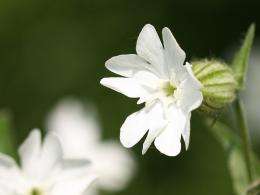Not only humans compensate: Dosage compensation of sex chromosomes in plants

Swiss researchers have found evidence that plants also "invented" the dosage compensation of sex chromosomes. They detected this phenomenon in the white campion.
Despite their different evolutionary paths, the white campion (Silene latifolia) and humans have got something in common: the XX/XY system of their sex chromosomes. Male and female flowers can be found on different individuals in this plant, which is quite rare in higher plants as most of them are hermaphroditic. The “males” have an X and a Y chromosome like men; the females have two X chromosomes like women.
In humans, this system is old. The Y chromosome has degenerated considerably over millions of years and hardly carries functioning genes anymore. Evolutionary scientists assume that so-called dosage compensation balances out the massive loss of genes and their gene products from the Y chromosome. It is a fundamentally important process to prevent an imbalance in an organism.
In humans, one of the woman’s X chromosomes is deactivated so that the man’s X chromosome and the woman’s remaining X chromosome produce the same number of gene products – in other words, RNA or proteins. In the case of the fruit fly Drosophila, however, the genes on the male’s X chromosome are copied twice as often to compensate for the presence of two X chromosomes in the female.
X compensates for the loss
This dosage compensation is also found in the white campion, as ETH-Zurich researchers Niklaus Zemp and Alex Widmer, professors of ecological plant genetics, demonstrated in a plant for the first time based on genetic studies in collaboration with colleagues from the University of Lyon. Genes from the male X chromosome are copied all the more strongly, the weaker the expression of the genes of the Y chromosome. The expression patterns in male and female plants exhibited similar high values of the genes that lie on the sex chromosomes, independently of how strongly the Y chromosome is copied in general.
Therefore, X compensates for the loss of Y to enable male and female plants to reach the same dosage. “Until now, dosage compensation could only be observed in the very old sex chromosome system in animals,” says Widmer. This supposedly developed 150 million years ago. The white campion is now the first plant in which this phenomenon has been detected.
A young system
For the biologists, this also means that dosage compensation in plants only evolved recently and that, no sooner than the sex chromosome system appears in an organism, it can develop extremely quickly. Widmer estimates that the system found in the white campion is “only” ten million years old and therefore still young from an evolutionary point of view. “However, our findings indicate that ten million years are sufficient for the dosage compensation system to re-evolve.”
For their study, the ETH-Zurich scientists analyzed around thirty-five billion components of the genetic code from six plant individuals using state-of-the-art sequencing technology, so-called next generation sequencing. This enables the genetic code to be determined at high speed and with great precision.
Dosage compensation and trisomy 21
Dosage compensation is extremely important for organisms. During the division of sex cells in humans, for instance, it can happen that certain chromosomes are not divided cleanly. As a result, one egg cell only receives one relevant chromosome and the other three. The “overproduction” that starts from one of the surplus chromosomes can cause severe damage. In humans, for instance, trisomy 21 is a fairly rare but widespread phenomenon. Those affected have three copies of Chromosome 21 instead of two. The overdose of gene products from this chromosome triggers the characteristic symptoms.
More information: Muyle A, et al. (2012) Rapid De Novo Evolution of X Chromosome Dosage Compensation in Silene latifolia, a Plant with Young Sex Chromosomes. PLoS Biol, doi:10.1371/journal.pbio.1001308
Provided by ETH Zurich


















